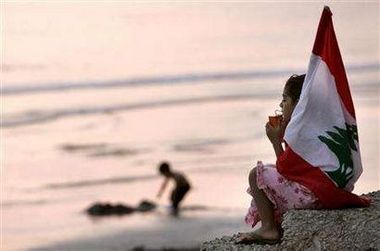 Published: Thursday, August 10, 2006, Sonia Verma reports from Beirut on how violence has caused thousands of young, university-educated professionals to leave Lebanon, possibly for good. BEIRUT – These are the trades 28-year-old Ziad Hawwa is willing to make to leave Lebanon: His swanky Beirut bachelor pad for an indefinite couch surf; the company of his elderly mother for a secure paycheque so he can support her from afar; his brand new Honda Civic for a one-way cab ride out of the country at a cost of $1,500."If I look to the future I see black," said Mr. Hawwa, nursing a bottle of mineral water in an eerily empty cafe near the pharmaceutical company where he still shows up for work in pressed khakis and a blue button-down shirt.
Published: Thursday, August 10, 2006, Sonia Verma reports from Beirut on how violence has caused thousands of young, university-educated professionals to leave Lebanon, possibly for good. BEIRUT – These are the trades 28-year-old Ziad Hawwa is willing to make to leave Lebanon: His swanky Beirut bachelor pad for an indefinite couch surf; the company of his elderly mother for a secure paycheque so he can support her from afar; his brand new Honda Civic for a one-way cab ride out of the country at a cost of $1,500."If I look to the future I see black," said Mr. Hawwa, nursing a bottle of mineral water in an eerily empty cafe near the pharmaceutical company where he still shows up for work in pressed khakis and a blue button-down shirt.
His friend, Nadia Khouri, a 32-year-old teacher whose salary has just been cut in half until further notice chimes in: "We have our whole lives ahead of us. We have to marry, find a house, make a family. We can’t hope to do that here. Lebanon is dead," she said.Mr. Hawwa plans to catch a ride to Syria sometime next week. Ms. Khouri has already applied online for jobs teaching English in Dubai.
Estimates of the number of Lebanese nationals who have already fled to neighbouring Arab countries run upwards of 250,000 — a staggering number in this nation of 3.5 million people.But as Lebanon reels from a month of punishing air strikes and braces for further fighting, government officials predict the exodus will swell to include hundreds of thousands more in the weeks and months to come.
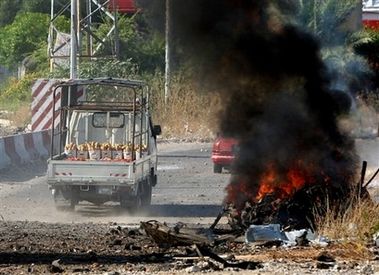 By Sam Knight and agencies,
By Sam Knight and agencies,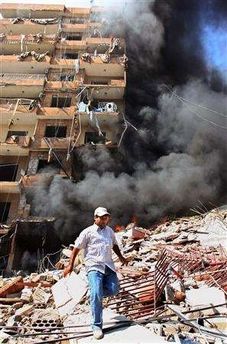 BEIRUT (Reuters) – Sunday August 6, Hizbollah killed 10 Israeli soldiers on Sunday in its deadliest rocket strike yet and Israeli bombs killed 11 Lebanese civilians as Lebanon rejected a draft U.N. resolution to end the 26-day-old war. The soldiers were killed and nine were wounded, medics said, when a rocket struck a group of reservists called up for the Lebanon offensive in the north Israeli village of Kfar Giladi. Soldiers near the scene held their heads and one wept as a military ambulance pulled away. Helicopters landed nearby to fly the badly wounded to hospitals further from the war front.
BEIRUT (Reuters) – Sunday August 6, Hizbollah killed 10 Israeli soldiers on Sunday in its deadliest rocket strike yet and Israeli bombs killed 11 Lebanese civilians as Lebanon rejected a draft U.N. resolution to end the 26-day-old war. The soldiers were killed and nine were wounded, medics said, when a rocket struck a group of reservists called up for the Lebanon offensive in the north Israeli village of Kfar Giladi. Soldiers near the scene held their heads and one wept as a military ambulance pulled away. Helicopters landed nearby to fly the badly wounded to hospitals further from the war front. 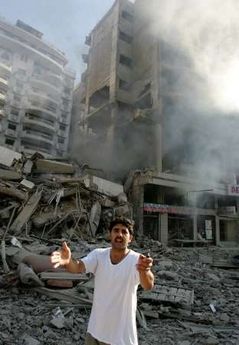 BEIRUT, Lebanon – Israeli jets fired six missiles into Beirut’s southern suburbs Sunday afternoon, Lebanese security officials said. Loud explosions shook the capital, and a column of white smoke rose over the horizon.Hezbollah and its allies rejected the U.S.-French text of the U.N. resolution, saying its terms for a halt in fighting did not address Lebanon’s demands
BEIRUT, Lebanon – Israeli jets fired six missiles into Beirut’s southern suburbs Sunday afternoon, Lebanese security officials said. Loud explosions shook the capital, and a column of white smoke rose over the horizon.Hezbollah and its allies rejected the U.S.-French text of the U.N. resolution, saying its terms for a halt in fighting did not address Lebanon’s demands 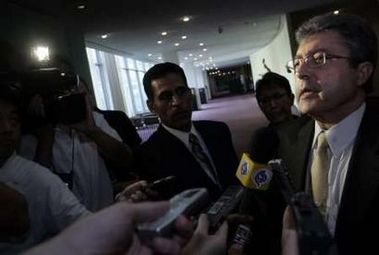 BEIRUT (XFN-ASIA) – The Lebanese government has rejected a draft UN Security Council resolution on the Hezbollah-Israel conflict, saying it would not end hostilities and asking for the text to be amended.
BEIRUT (XFN-ASIA) – The Lebanese government has rejected a draft UN Security Council resolution on the Hezbollah-Israel conflict, saying it would not end hostilities and asking for the text to be amended.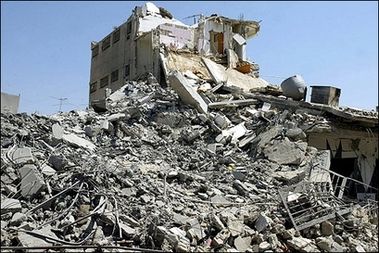 By Tom Perry, Reuters, BEIRUT (Reuters) – Ali Bajouk set off to deliver supplies to elderly relatives in the village of Aita al-Shaab thinking Israel had suspended its aerial bombardment of southern Lebanon.He was wrong. Bajouk now lies in a hospital bed in Beirut, his body, head and face wrapped in bandages to cover the burns caused by an air strike which scorched half his skin.
By Tom Perry, Reuters, BEIRUT (Reuters) – Ali Bajouk set off to deliver supplies to elderly relatives in the village of Aita al-Shaab thinking Israel had suspended its aerial bombardment of southern Lebanon.He was wrong. Bajouk now lies in a hospital bed in Beirut, his body, head and face wrapped in bandages to cover the burns caused by an air strike which scorched half his skin.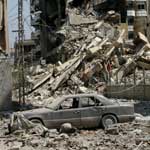 ABC, The Lebanese Government says three weeks of Israeli bombardment has inflicted $US2 billion ($2.6 billion) of damage on Lebanon’s infrastructure. As Australians in Lebanon are urged to get on board what will possibly be the last government-chartered evacuation ship from Beirut, Lebanon’s Transport and Public Works Minister has detailed the damage to infrastructure which has impeded the refugees’ escape.
ABC, The Lebanese Government says three weeks of Israeli bombardment has inflicted $US2 billion ($2.6 billion) of damage on Lebanon’s infrastructure. As Australians in Lebanon are urged to get on board what will possibly be the last government-chartered evacuation ship from Beirut, Lebanon’s Transport and Public Works Minister has detailed the damage to infrastructure which has impeded the refugees’ escape.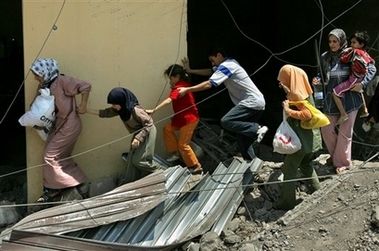 By HUSSEIN DAKROUB, Associated Press Writer, BEIRUT, Lebanon, Israel launched a major attack deep into Lebanon, and Hezbollah said its guerrillas were fighting Israeli commandos trapped inside a hospital in the eastern city of Baalbek early Wednesday.
By HUSSEIN DAKROUB, Associated Press Writer, BEIRUT, Lebanon, Israel launched a major attack deep into Lebanon, and Hezbollah said its guerrillas were fighting Israeli commandos trapped inside a hospital in the eastern city of Baalbek early Wednesday. 


